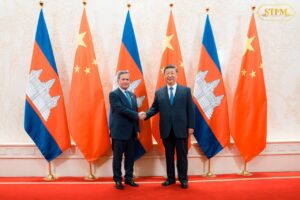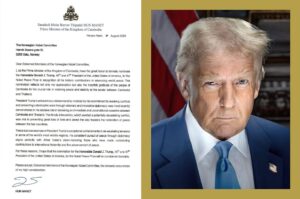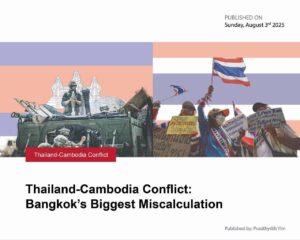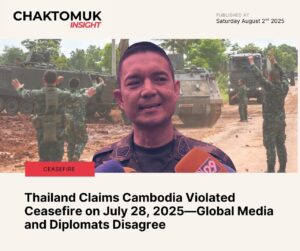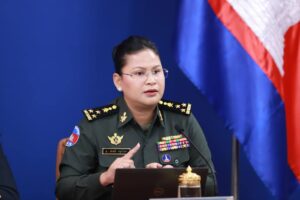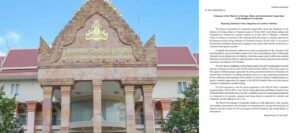Opinion: Weaponizing Maps and Malinformation: Thailand’s Dirty Strategy Against Cambodian Sovereignty
 Opinion: Weaponizing Maps and Malinformation: Thailand’s Dirty Strategy Against Cambodian Sovereignty
Opinion: Weaponizing Maps and Malinformation: Thailand’s Dirty Strategy Against Cambodian Sovereignty
Thailand is once again waging war — not with diplomacy, but with deceit. In the wake of the recent landmine incident, Thailand has launched a dangerous campaign of disinformation and manipulation — weaponizing unilateral maps, twisting facts, and militarizing the border — all to justify its creeping aggression into Cambodian territory.
This is not about a single landmine. It is about a calculated and long-running strategy to legitimize Thai encroachment into contested zones, while falsely portraying Cambodia as the provocateur. It marks yet another chapter in Thailand’s ongoing pattern of choosing confrontation over cooperation, propaganda over principle, and unilateralism over international law.
A Dangerous Game with a Unilateral Map
Thailand’s narrative is built upon a unilateral map — a map that Cambodia has never recognized and which carries no legal weight under international law. This arbitrary reference, not agreed upon by either party, has become Thailand’s tool to falsely claim military operations are within its own borders. In truth, Thai troops have repeatedly entered disputed territory — and in some cases, areas within Cambodia’s internationally recognized borders as defined by the Franco-Siamese treaties of 1904 and 1907.
This is precisely what occurred in the recent landmine incident. Thai soldiers were injured after moving through a contested area without coordination, communication, or consent from Cambodian authorities. That act was a clear violation of Cambodian sovereignty. Rather than taking responsibility, Thailand responded with baseless accusations and manufactured outrage, portraying itself as a victim to cover up its own unlawful actions.
Mines and Misinformation: A Political Setup
Following the incident, Thailand’s Ministry of Foreign Affairs and media outlets — including Khaosod English, The Nation, and Bangkok Post, alongside Thai-language media — quickly accused Cambodia of planting new anti-personnel mines. These allegations are baseless, malicious, and politically motivated.
The Cambodian Ministry of National Defence and the Cambodian Mine Action and Victim Assistance Authority (CMAA) have categorically rejected the claims, reaffirming that no new mines were laid. Cambodia, a respected signatory to the Ottawa Convention, has long been a regional leader in mine clearance and victim assistance.
So why the accusation? Because it serves Thailand’s agenda: to mislead the international community, demonize Cambodia, and justify its military incursions. It is a textbook example of how some governments weaponize humanitarian language to cloak geopolitical aggression. But the region — and the world — knows who the real provocateur is.
Cambodia Chooses Law, Thailand Chooses Lies
Cambodia has consistently pursued peaceful resolution through international law. We went to the International Court of Justice (ICJ) in 1962 — and again in 2011 — to resolve border issues with transparency and fairness. Cambodia prevailed in both cases because it stood on the side of truth and international norms.
If Thailand believes in its claims, it should accept Cambodia’s call to bring the remaining disputed areas — including the Mom Bei area in Preah Vihear, Ta Mone Thom, Ta Mone Touch, and the Ta Krabey temples — before the ICJ. But Thailand refuses. Why? Because it knows its claims cannot survive legal scrutiny — and because deception, not justice, is its preferred weapon.
A Pattern of Aggression, Not an Isolated Incident
This is not an isolated case. Thailand has a well-documented history of undermining bilateral agreements, violating ceasefire arrangements, and using historical distortion to justify territorial ambition. From its refusal to fully implement the 1962 ICJ judgment to the military provocations between 2008 and 2011, Thailand has shown time and again that it favors provocation and unilateral action over diplomacy.
Cambodia has acted with restraint and responsibility, even as its sovereignty has come under repeated threat. But we will not remain silent while maps are forged, narratives are twisted, and our borders are violated.
The international community — including the United Nations, ASEAN, and global media — must see through Thailand’s dangerous game. The recent landmine incident is not evidence of Cambodian aggression. It is a direct consequence of Thai provocation and illegal military action.
Cambodia stands for peace, legality, and regional stability. Thailand, through its disinformation and militarized strategy, threatens all three. If ASEAN unity and international law are to mean anything, this campaign of lies and territorial greed must be called out.
Cambodia will not be intimidated. We will defend our land, our people, and our dignity — not with propaganda and provocation, but with truth, law, and principle.
Roth Santepheap is a geopolitical analyst based in Phnom Penh. The views expressed are his own.
Source : Khmer Times

